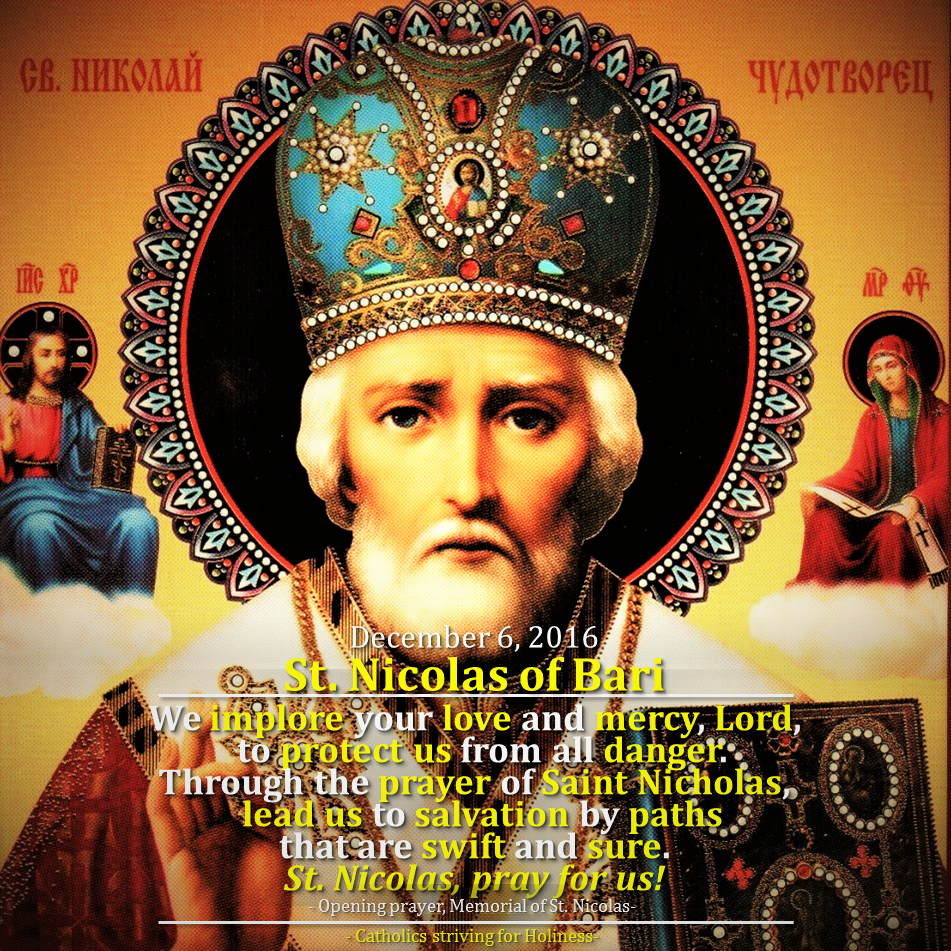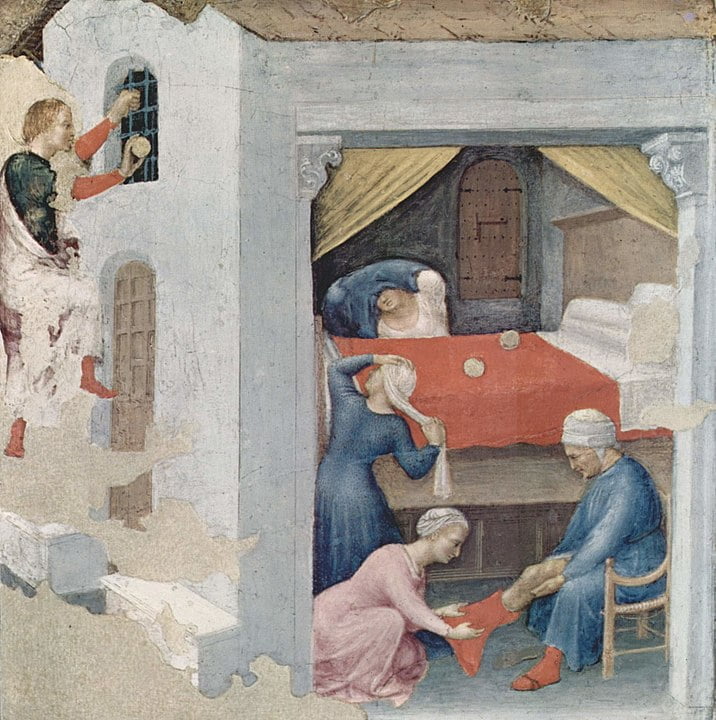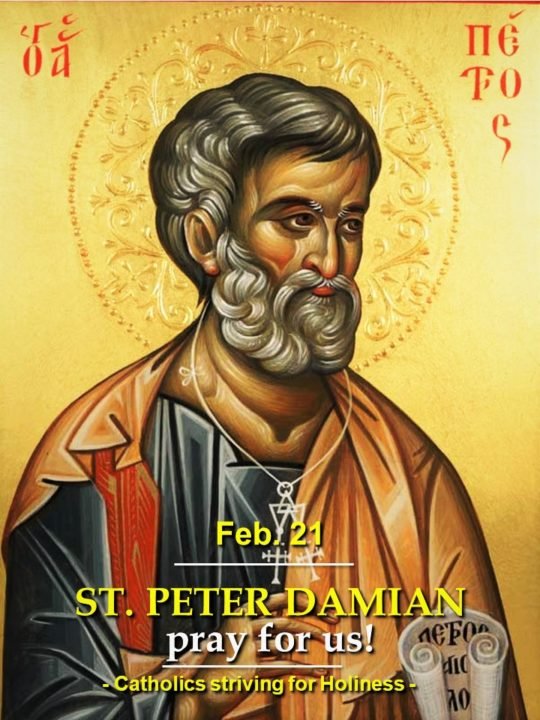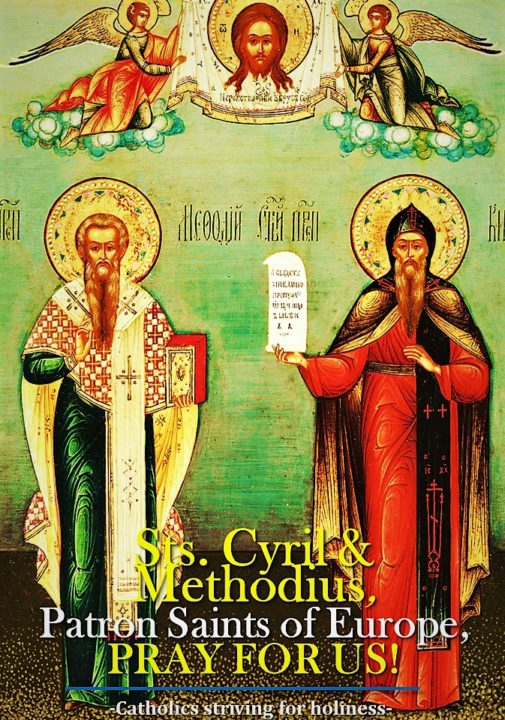December 6:
ST. NICHOLAS OF BARI, BISHOP.
Nicolas the Wonderworker “Santa Claus” explained.

Saint Nicholas of Bari (270–343), also called Nikolaos of Myra, was a Greek Bishop of Myra (Demre, part of modern-day Turkey) in Lycia. More than two thousand temples are dedicated to him around the world.
“He was born in Patara, in the region of Lycia (currently within the territory of Turkey) into a wealthy family and since he was a child he was noted for his pious and generous character. His parents, fervent Christians, educated him in the faith. After the death of his parents, Nicholas inherited a large fortune that he put at the service of those in need, according to the hagiography written by Saint Methodius, Archbishop of Constantinople.
During his time as bishop, and in his eagerness to eradicate pagan cults, he ordered the demolition of the temple of Artemis in Mira; the largest and most famous temple in Lycia, as well as several other pagan buildings. By a decree of the Emperor Licinius against the Christians he was imprisoned and his beard burned, being released by the Emperor Constantine.
He participated in the Council of Nicaea, condemning the doctrines of Arius, who refused to admit the dogma of the divinity of Christ. To combat errors, he used exquisite tenderness, achieving great and sincere conversions, despite his discreet speculative and oratory talent that Orientals like so much. However, when it came to protecting the weakest from the powerful, Saint Nicholas, despite his advanced age, acted with great courage and vigor.
Saint Nicholas of Bari died on December 6, 343 in Mira, but his remains rest in the Italian port city of Bari, where they ended up after they were taken out of Turkey after the Muslim conquest. After his death he became the first non-martyred saint to enjoy special devotion in the East and West. A multitude of miraculous stories appeared about him, disfiguring, at times, his eminently practical and simple character. (From opusdei.es).”
He has been venerated throughout the Church, especially since the 10th century. Because of his help to the poor he is the patron saint of pawnbrokers, whose insignia of three golden balls represent the three purses of gold he is said to have given secretly to a poor man who could not afford dowries for his three daughters.

The Dowry of the Three Virgins by By Gentile da Fabriano – The Yorck Project (2002) 10.000 Meisterwerke der Malerei (DVD-ROM), distributed by DIRECTMEDIA Publishing GmbH. ISBN: 3936122202., Public Domain, https://commons.wikimedia.org/w/index.php?curid=151516
Because of the many miracles attributed to his intercession, he is also known as Nikolaos the Wonderworker.
He had a reputation for secret gift-giving, such as putting coins in the shoes of those who left them out for him, and thus became the model for Santa Claus, whose modern name comes from the Dutch Sinterklaas, itself from a series of elisions and corruptions of the transliteration of “Saint Nikolaos.”
In 1087, part of his relics were brought to Bari, in southeastern Italy, and for this reason, he is also known as Nikolaos of Bari. The remaining bones were taken to Venice in 1100.
Let the power of love conquer the terror of death
From a treatise on John by St. Augustine
When the Lord asks Peter if he loves him, he is asking something he already knows. Yet he does not ask only once, but a second and third time. Each time Peter’s answer is the same: You know I love you. Each time the Lord gives him the same command: Tend my sheep.
Peter had denied Christ three times, and to counter this he must profess his faith three times. Otherwise his tongue would seem quicker to serve fear than love, and the threat of death would seem to have made him more eloquent than did the presence of life. If denying the shepherd was proof of fear, then the task of love is to tend his flock.
When those who are tending Christ’s flock wish that the sheep were theirs rather than his, they stand convicted of loving themselves, not Christ. And the Lord’s words are a repeated admonition to them and to all who, as Paul writes sadly, are seeking their own ends, not Christ’s.
Do you love me? Tend my sheep. Surely this means: “If you love me, your thoughts must focus on taking care of my sheep, not taking care of yourself. You must tend them as mine, not as yours; seek in them my glory, not yours; my sovereign rights, not yours; my gain, not yours. Otherwise you will find yourself among those who belong to the ‘times of peril’, those who are guilty of self-love and the other sins that go with that beginning of evils.”
So the shepherds of Christ’s flock must never indulge in self-love; if they do they will be tending the sheep not as Christ’s but as their own. And of all vices this is the one that the shepherds must guard against most earnestly: seeking their own purposes instead of Christ’s, furthering their own desires by means of those persons for whom Christ shed his blood.
The love of Christ ought to reach such a spiritual pitch in his shepherds that it overcomes the natural fear of death which makes us shrink from the thought of dying even though we desire to live with Christ. However distressful death may be, the strength of love ought to master the distress. I mean the love we have for Christ who, although he is our life, consented to suffer death for our sake.
Consider this: if death held little or no distress for us, the glory of martyrdom would be less. But if the Good Shepherd, who laid down his life for his sheep, has made so many of those same sheep martyrs and witnesses for him, then how much more ought Christ’s shepherds to fight for the truth even to death and to shed their blood in opposing sin? After all, the Lord has entrusted them with tending his flock and with teaching and guiding his lambs.
With his passion for their example, Christ’s shepherds are most certainly bound to cling to the pattern of his suffering, since even the lambs have so often followed that pattern of the chief shepherd in whose one flock the shepherds themselves are lambs. For the Good Shepherd who suffered for all mankind has made all mankind his lambs, since in order to suffer for them all he made himself a lamb.
COLLECT
We humbly implore your mercy, Lord: protect us in all dangers through the prayers of the Bishop Saint Nicholas, that the way of salvation may lie open before us. Through our Lord
ORIGINAL PHOTO SOURCE: http://orthodoxosllc.com/2390-thickbox_default/icon-st-nicholas-the-wonderworker.jpg
Stay updated: subscribe by email for free TO OUR NEW WEBSITE www.catholicsstrivingforholiness.org (PUT YOUR EMAIL IN THE SUBSCRIBE WIDGET).
We are also in www.fb.com/Catholicsstrivingforholiness. Kindly help more people in their Christian life by liking our page and inviting your family, friends and relatives to do so as well. Thanks in advance and God bless you and your loved ones! Fr. Rolly Arjonillo

